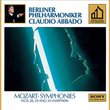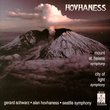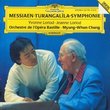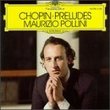| All Artists: Ludwig van Beethoven, Maurizio Pollini Title: Beethoven: Die Späten Klaviersonaten Members Wishing: 0 Total Copies: 0 Label: Deutsche Grammophon Release Date: 8/12/1997 Genre: Classical Styles: Forms & Genres, Sonatas, Historical Periods, Classical (c.1770-1830), Romantic (c.1820-1910) Number of Discs: 2 SwapaCD Credits: 2 UPC: 028944974027 |
Search - Ludwig van Beethoven, Maurizio Pollini :: Beethoven: Die Späten Klaviersonaten
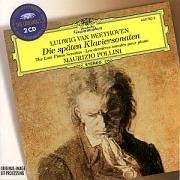 | Ludwig van Beethoven, Maurizio Pollini Beethoven: Die Späten Klaviersonaten Genre: Classical
No Description Available. Genre: Classical Music Media Format: Compact Disk Rating: Release Date: 12-AUG-1997 |
Larger Image |
CD DetailsSynopsis
Product Description No Description Available. Genre: Classical Music Media Format: Compact Disk Rating: Release Date: 12-AUG-1997 Similarly Requested CDs
|
CD ReviewsThe sublime spirituality of Beethoven and Pollini Chip Hartranft | Arlington, MA | 02/02/2000 (5 out of 5 stars) "Maurizio Pollini is unlike any other pianist in the history of music. The son of an architect, he has an astonishing memory and is endowed with the uncanny ability to evoke an organic sense of wholeness in nearly every piece he has undertaken to play. His technical gifts - supernatural articulation, voicing, pedalling, accuracy - are unsurpassed. Yet his remarkable control ennables Pollini to play with utter freedom and spontaneity, a paradox that is not widely understood even by professional musicians and critics. The more familiar the repertoire, the more revelatory his approach often seems to be.This is very much the case with these performances, certainly the finest of Pollini's Beethoven recordings. The late sonatas require precisely the same gifts with which this pianist has been blessed like no other: lucidity, simplicity, an often terrifying intensity that yields to the most tender lyricism. There is no place in late Beethoven, nor in Pollini's sensibility, for generic expressivity of any kind. Every phrase is distilled to its essence, but without a trace of premeditation. Pollini gives us a remarkably clear window into the liberative spirituality of a composer for whom most egoic concerns had been subsumed in his artistic struggle. If the late sonatas are important to you, don't hesitate to buy this record - you'll hear the performances of a lifetime." A compelling and controversial classic R. Lane | Tracy, CA USA | 11/20/2004 (5 out of 5 stars) "I fondly remember the time I bought the distinctive green LP box set of these recordings in the late 1970s. I was not very familiar with the Beethoven piano sonatas. I made many attempts to try them out by auditioning the local library copies by well known artists, or whatever there was in the scant record collection at the college radio station music library. All to no avail. The music just didn't click for me. I read some of the rave reviews about these Pollini recordings for a few months, so one day I just decided to bite the bullet and buy the LP box set. I was determined that if I'd give all the works in it enough thorough and attentive listening, I would understand why the music is so loved by so many. Well, it didn't take much determination. From the first beat of op. 101, I got hooked. Pollini's unusual combination of high energy and contrasting effective tenderness made the music come alive for me. When I got to the famous op. 106 "Hammerklavier", I must have replayed it 4 times the first night. The LPs were worn out quickly. Actually, I liked them so much I took even more care than I normally would, and I was pretty picky about LP care in those days. I was not about to see these LPs get thrashed! Time has brought me around to appreciate the Beethoven 32 in ways that I never thought I could. I now treasure such notables as Kempff, Arrau, Brendel, and many more. Pollini seems somewhat excessive in comparison to most of the artists I now revere in this reportoire. But there is room for much interpretation in Beethoven, and I find myself returning to these Pollini recordings often just to remeber how much more there is to these pieces than is often rendered in more "classical" and accepted interpretations. Severely disappointed was I when these recordings first appeared on CD in the 1980s. The first CD versions were dreadfully riddled with a resonant twang that marred virtually every movement in every sonata at some point. The LPs were OK, but this music, especially with the high dynamic contrast of Pollini's playing, demand hushed quiet to be appreciated. CDs psomised some that hushed quietness, being free from crakcles, hiss, and so on. But the timber of the piano was very unnatural. Listening to those CDs was very painful. Once again, DG have redeemed themselves by remastering these spectacular analogue recordings in the late 1990s to give us what have before us now. The Originals series continually give us CDs that approach the warmth and naturalness of analogue LPs. Thanks Universal. Give us more. After reviewing many releases in the Originals series though, it is time I do criticize DG about one aspect in their reissues that is not "Orgiinal". The liner notes. Like most of the other releases in the series, there are virtually no notes about the works themselves. The only notes are about the performer, in this case Pollini, and perhaps the performers' affinity for the music on the disk, or something special about the particular recording. In this case, the original LP box set had excellent essays about the late sonatas. I read them several times, and picked more insights with each reading. The lack of notes about the works on the disk make it difficult to recommend any items in the Originals series as first choices for collectors that are not going to buy multiple versions. But that is exactly what these should be. So get with it, Universal, and next time give us ALL of the Originals, inculding the notes." You call THIS unemotional??? Michael Alexander | New Haven, CT United States | 12/24/2003 (5 out of 5 stars) "First of all, if you're a Beethoven neophyte still trying to pick up the basics and wondering whether his late sonatas are worth getting, I have one thing to say to you: drop EVERYTHING. You need his late piano sonatas, and you need them now. Not only are these works profoundly emotional in the way his late work almost always was, but they're technically dazzling and so inventive that later composers were still exploring the avenues he'd opened up for almost a century. In the monumental Opus 106 "Hammerklavier", Beethoven managed not only to write a piece so difficult that even the great virtuosi (except for Pollini, and that's one of the many reasons to buy this recording) tend to make a few mistakes, but also to practically invent Chopin in the process. In the Opus 111, the very last one, not only does Beethoven bare his soul with as much emotion as this tormented composer ever revealed, but in the process he blows apart sonata form altogether, does some things with rhythm in the second movement that wouldn't get picked up again until jazz came along(check out about 6:30 into track 8 if you don't believe me), and makes a shimmeringly gorgeous farewell, making those 20 minutes the best 20 minutes of piano music I'm aware of.Pollini, never faulted for his almost-inhuman technique (as I said before, check out the Hammerklavier), is sometimes called unemotional because his playing is so razor-sharp, and because he refuses to let his playing fall into the trap of over-sentimentality. There are times this is true, mostly when he plays late Romantic works, which are SUPPOSED to be a little schlocky. Beethoven, though, is a different story: the paradoxical composer who managed to have all the power over structure of the Classical era before him, while using that incredible control (much like Pollini) in ever-more-innovative and personal ways to produce works evoking depths of emotion beyond anything that had been heard before.What all this means, for this recording, is that Pollini manages to pull off the same paradoxical feat as Beethoven: having all the virtuosic skill, all the sense of the logic of these pieces, while pulling out some terribly profound feeling from these works. He does it by being so faithful to the score that, as one reviewer below did, you could read along without ever noticing a deviation from the composer's extremely precise directions (including some faster-than-traditional tempi that, in my opinion, make these works a lot more interesting than the wishy-washy feeling of performances by people like Kempff). On the other hand, this supreme grasp of the technical aspects leaves Pollini free to play it _naturally_, with the unexaggerated but supremely poignant emotion of someone who simply lets the music flow through them. Highlights include, well, everything, but especially the Opus 111(perfection!), the Hammerklavier, and the Opus 101. Truly a master performance, and I've never heard better."
|

 Track Listings (8) - Disc #1
Track Listings (8) - Disc #1



